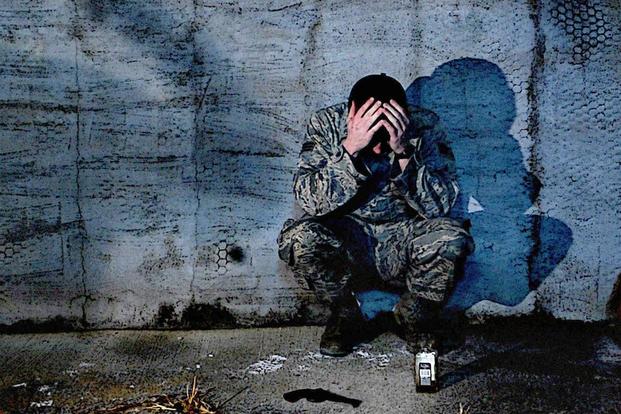While suicide remains a rare event among U.S. troops, 325 active-duty members died by suicide in 2018, the highest number since the Defense Department began collecting the data in 2001 and exceeding a record set in 2012.
According to a report released this week by the Defense Suicide Prevention Office, 139 active-duty soldiers, 68 sailors, 60 airmen and 58 Marines died by suicide last year, 40 more service members than the previous year.
The figure is higher than the sum of deaths reported by the individual services in January -- the result of continued death investigations -- and tragically exceeds the previous record of 321 in 2012.
For three of the services, the numbers represent an increase over the previous year. The Army in 2017 saw 114 deaths by suicide, the Navy, 65, and the Marine Corps, 43. Only the Air Force saw a decline in suicide from the previous year. In 2017, it had 63.
Earlier this year, Defense Department officials said the rates of suicide, which provide a more accurate understanding of the occurrence among the military population, are "devastating and unacceptable and not going in the desired direction."
"My colleagues and I know that every single life lost is a tragedy and each one has a deeply personal story. With each death, we know there are families and often children with shattered lives," Elizabeth Van Winkle, Director of the DoD’s Office of Force Resiliency, told members of Congress during a joint hearing on veterans and military suicide May 21.
Related: Air Force to Pause Operations After a Spike in Suicides
The military deaths reflect a national trend. In the U.S. the suicide rate has increased by 33% since 1999, and suicide is the second leading cause of death among people 10 to 34 years old.
The Defense and Veterans Affairs Departments have collaborated on efforts to reduce suicide in the ranks and among veterans, who die by suicide at an average rate of 20 a day. The Defense Department is preparing to issue a comprehensive report on military suicides this summer, and the two departments are gearing up for a joint conference on suicide, scheduled to be held in Nashville this August.
An analysis of Defense Department suicides in 2017 published this year found that roughly half of those who completed suicide that year had a known mental health condition and half had contact with the military health system within 90 days of their deaths.
Most were male (95%) and white (81%) and more than half had a history of deployment (57%).
According to the report, the suicide rate in 2017 among active duty troops was 21.9 deaths per 100,000 members, a slight uptick from the 2016 rate of 21.5 per 100,000, but not considered a "statistically significant" increase.
The age-adjusted civilian rate, which includes American civilians and service members, is 17.4 deaths per 100,000.
The year-end figures for 2018 showed a drop in suicides in the Reserve component, from 226 in 2017 to 216 in 2018. There were two more deaths among National Guard members in 2018 from the previous year, 135 up from 133.
The National Guard continues to have the highest rate of suicide among components, at 29.1 suicides per 100,000 people.
In addition to publishing the data for 2018, the Defense Suicide Prevention Office released information on the number of suicides by military personnel in the first quarter of 2019. From January through March, 90 active duty service members died by suicide, including 30 soldiers, 20 sailors, 26 airmen and 14 Marines.
In the same time frame in 2018, 81 service members died by suicide: 36 soldiers, 23 sailors, 9 airmen and 13 Marines.
Van Winkle said each loss “reverberates beyond the unit, beyond the commander and beyond the service” and the Defense Department and services remain committed to the well-being of service members.
“We must meet that sacred obligation because we need each and every woman and man who bravely signs up to fight for this nation,” she said.
The Coast Guard, which is in the Department of Homeland Security, does not publish its suicide data and has not provided the information despite multiple requests from Military.com.
An unverified list posted online by a Coast Guard veteran who walks to support suicide awareness and prevention said at least four Coast Guard men and women died by suicide in 2018.
If you or someone you know needs help, the Veterans Crisis Hotline is staffed 24 hours a day, seven days a week, at 800-273-8255, press 1. Services also are available online at www.veteranscrisisline.net or by text, 838255.
-- Patricia Kime can be reached at Patricia.Kime@Military.com. Follow her on Twitter @patriciakime.














